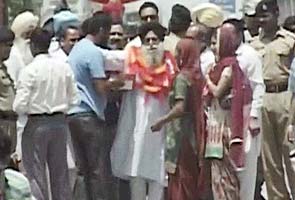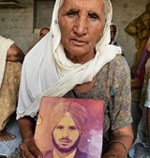
Wagah, June 28: After spending 31 years in Pakistani jail, Indian prisoner Surjeet Singh today walked free and crossed over to his home country to an emotional renunion with his family.
69-year-old Singh, who released from Lahore's Kot Lakhpat Jail this morning, crossed to the Indian side at Wagah border where he was welcomed with garlands and red shawls by his family and villagers, after completing official procedures on the Pakistan side of the border.
"After 30 years, I am meeting my children. I am very happy," he told reporters here.
He said he did not have any hardship in the Pakistani jail and he got everything daily necessities like food and clothes.
Referring to Sarabjit Singh, who on the death row in the Lahore jail, he said the Indian convict was doing fine. He said he used to meet him only a weekly basis.
Asked if Sarabjit Singh had sent any message for his family, he said, "No".
Singh served a life term following his arrest on charges of spying in the 1980s in Pakistan. He was given the death sentence under the Pakistan Army Act in 1985. The death sentence was commuted to life imprisonment in 1989 by then President Ghulam Ishaq Khan.
Pakistani security personnel had escorted Singh to the Wagah land border crossing, where he was handed over to Indian authorities.
His release from prison came after reports emerged on Tuesday that Pakistan was to free Sarabjit Singh. But later, Pakistan clarified that authorities had actually ordered the release of Surjeet and not Sarabjit.

Earlier:
Surjeet freed, to come home via Wagah
Attari (Punjab), June 28: Indian prisoner Surjeet Singh was released from Lahore's Kot Lakhpat jail after over three decades in captivity Thursday and reached the Wagah border on the Pakistan side on his way back home, officials said.
Surjeet would walk into India after Pakistan authorities completed all formalities, Border Security Force (BSF) officials here told IANS.
"This can take up to two-three hours," one BSF official said.
He was brought to Wagah, which falls in Pakistan, in a police prison van.
His family, including son Kulwinder Singh, were waiting on the Attari side of the joint border checkpost.
"We are very happy that he is being finally released. We will have big celebrations," Kulwinder Singh, who arrived here early Thursday morning with family members, relatives and villagers, said.
Attari, 30 km from Amritsar city, is the border checkpost on the Indian side.The Pakistan authorities are also likely to allow 311 Indian fishermen to walk back to India after their release from Karachi prison Wednesday. Most of the fishermen are from Gujarat.
They were in Pakistani custody for periods ranging from a few months to three years after they were accused of violating Pakistan's territorial water off the coast of Gujarat.
Surjeet, 69, spent over 30 years in Pakistani jail after being arrested on charges of spying. He completed his life term in 2005.
His family in Phidde in Ferozepur district are eagerly waiting for his return.
"We are all very eager to receive him. We will make him very comfortable here," Surjeet's daughter-in-law said.





Comments
Add new comment